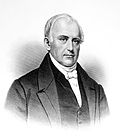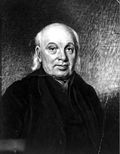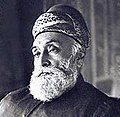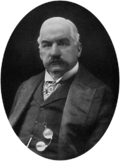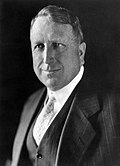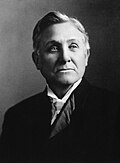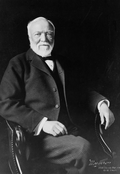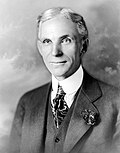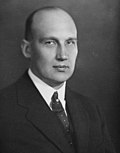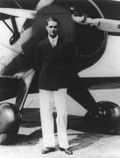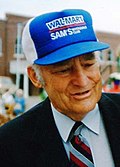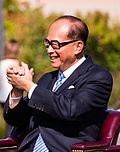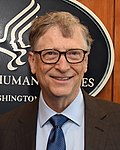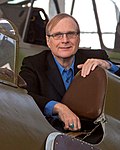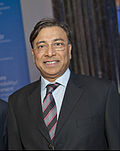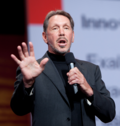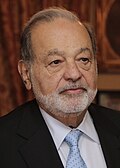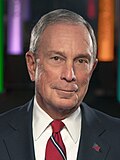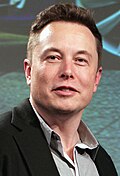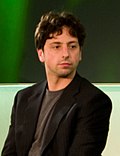Business magnate: Difference between revisions
No edit summary Tags: Reverted Visual edit |
Entranced98 (talk | contribs) m Reverted edit by Turtlejeff (talk) to last version by Niasoh |
||
| (263 intermediate revisions by more than 100 users not shown) | |||
| Line 1: | Line 1: | ||
{{ |
{{Short description|Entrepreneur who has achieved wealth and prominence from a particular industry}} |
||
{{ |
{{Redirect-multi|2|Tycoon|Industrialist}} |
||
{{ |
{{For|magnates in the mass media industry|Media proprietor}} |
||
{{Verification|date=April 2023}} |
|||
{{Multiple issues| |
|||
{{globalize|date=March 2014}} |
|||
{{More citations needed|date=September 2018}} |
|||
}} |
|||
| ⚫ | A '''business |
||
| ⚫ | A '''business magnate''', also known as an '''industrialist''' or '''tycoon''', is a person who has achieved immense wealth through the creation or ownership of multiple lines of [[big business|enterprise]]. The term characteristically refers to a powerful [[entrepreneur]] and [[investor]] who controls, through personal enterprise ownership or a dominant shareholding position, a firm or industry whose goods or services are widely consumed. Such individuals have been known by different terms throughout history, such as [[Robber baron (industrialist)|robber barons]], [[Captain of industry|captains of industry]], moguls, [[Business oligarch|oligarchs]], [[plutocrats]], or [[tai-pan]]s. |
||
| ⚫ | |||
| ⚫ | |||
| ⚫ | |||
| ⚫ | |||
| ⚫ | |||
| ⚫ | |||
| ⚫ | The term ''tycoon'' derives from the [[Japanese language|Japanese]] word {{Nihongo|[[taikun]]|大君}}, which means "great lord", used as a title for the ''[[shōgun]]''.<ref>{{cite book |title=American English Spelling: An Informal Description |last=Cummings |first= Donald Wayne |year=1988 |publisher=JHU Press |isbn=978-0-8018-3443-1 |page=277 |url=https://books.google.com/books?id=1OVIqCV57pYC |access-date=22 May 2012}}</ref><ref>{{cite web |url=http://www.merriam-webster.com/dictionary/tycoon |title=tycoon |work=Merriam-Webster |access-date=22 May 2012 |quote=Origin of TYCOON Japanese taikun}}</ref> The word entered the English language in 1857<ref>{{cite web |url=http://www.merriam-webster.com/dictionary/tycoon |title=tycoon |work=Merriam-Webster |access-date=22 May 2012 |quote=First Known Use: 1857}}</ref> with the return of [[Matthew C. Perry|Commodore Perry]] to the United States. |
||
| ⚫ | The term ''tycoon'' derives from the [[Japanese language|Japanese]] word {{Nihongo|''[[taikun]]''|大君}}, which means "great lord", used as a title for the ''[[shōgun]]''.<ref>{{cite book |title=American English Spelling: An Informal Description |last=Cummings |first= Donald Wayne |year=1988 |publisher=JHU Press |isbn=978-0-8018-3443-1 |page=277 |url=https://books.google.com/books?id=1OVIqCV57pYC |access-date=22 May 2012}}</ref><ref>{{cite web |url=http://www.merriam-webster.com/dictionary/tycoon |title=tycoon |work=Merriam-Webster |access-date=22 May 2012 |quote=Origin of TYCOON Japanese taikun}}</ref> The word entered the English language in 1857<ref>{{cite web |url=http://www.merriam-webster.com/dictionary/tycoon |title=tycoon |work=Merriam-Webster |access-date=22 May 2012 |quote=First Known Use: 1857}}</ref> with the return of [[Matthew C. Perry|Commodore Perry]] to the United States. US President [[Abraham Lincoln]] was humorously referred to as ''the Tycoon'' by his aides [[John Nicolay]] and [[John Hay]].<ref>{{cite news |title=Return of the Samurai |first=Adam |last=Goodheart |url=http://opinionator.blogs.nytimes.com/2010/11/10/return-of-the-samurai/ |newspaper=The New York Times |date=10 November 2010 |access-date=22 May 2012}}</ref> The term spread to the business community, where it has been used ever since. |
||
==Usage== |
==Usage== |
||
{{Globalize|date=January 2024|2=US}} |
|||
Modern business magnates are entrepreneurs that amass on their own or wield substantial family fortunes in the process of building or running their own businesses. Some are widely known in connection with these entrepreneurial activities, others through highly-visible secondary pursuits such as [[philanthropy]], political fundraising and campaign financing, and sports team ownership or sponsorship. |
Modern business magnates are entrepreneurs that amass on their own or wield substantial family fortunes in the process of building or running their own businesses. Some are widely known in connection with these entrepreneurial activities, others through highly-visible secondary pursuits such as [[philanthropy]], political fundraising and campaign financing, and sports team ownership or sponsorship. |
||
The terms ''mogul'', ''tycoon'' and ''baron'' were often applied to late |
The terms ''mogul'', ''tycoon'', and ''baron'' were often applied to late-19th- and early-20th-century North American business magnates in [[natural resource|extractive industries]] such as [[mining]], [[logging]] and [[petroleum]], transportation fields such as [[shipping]] and [[rail transport|railroad]]s, manufacturing such as [[Automobile manufacturing|automaking]] and [[steel]]making, in [[banking]], as well as newspaper publishing. Their dominance was known as the [[Second Industrial Revolution]], the [[Gilded Age]], or the [[Robber baron (industrialist)|Robber Baron Era]]. |
||
<!--Please discuss additions to the below list on the talk page so it does not become unwieldy--> |
<!--Please discuss additions to the below list on the talk page so it does not become unwieldy--> |
||
Examples of |
Examples of business magnates in the western world include historical figures such as pottery entrepreneur [[Josiah Wedgwood]], oilmen [[John D. Rockefeller]] and [[Fred C. Koch]], automobile pioneer [[Henry Ford]], aviation pioneer [[Howard Hughes]], shipping and railroad veterans [[Aristotle Onassis]], [[Cornelius Vanderbilt]], [[Leland Stanford]], [[Jay Gould]] and [[James J. Hill]], steel innovator [[Andrew Carnegie]], newspaper publisher [[William Randolph Hearst]], poultry entrepreneur [[Arthur Perdue]], retail merchant [[Sam Walton]], and bankers [[J. P. Morgan]] and [[Mayer Amschel Rothschild]]. Contemporary industrial tycoons include e-commerce entrepreneur [[Jeff Bezos]], investor [[Warren Buffett]], computer programmers [[Bill Gates]] and [[Paul Allen]], technology innovator [[Steve Jobs]], vacuum cleaner retailer Sir [[James Dyson]], media proprietors [[Sumner Redstone]], [[Ted Turner]] and [[Rupert Murdoch]], industrial entrepreneur [[Elon Musk]], steel investor [[Lakshmi Mittal]], telecommunications investor [[Carlos Slim]], Virgin Group founder Sir [[Richard Branson]], Formula 1 executive [[Bernie Ecclestone]], and internet entrepreneurs [[Larry Page]] and [[Sergey Brin]].<!--Please discuss additions to the above list on the talk page so it does not become unwieldy--> |
||
== Business magnates == |
== Business magnates == |
||
<!--NOTE:Let's try and keep this list at no more than 24 pictures--> |
|||
<gallery mode="nolines" heights="200"> |
<gallery mode="nolines" heights="200"> |
||
File:Portrait of Josiah Wedgwood gupjg13 4 ics8nad.tiff|[[Josiah Wedgwood]] |
|||
| ⚫ | |||
File: |
File:Samuel Slater industrialist.jpg|[[Samuel Slater]] |
||
File:James Finlayson (1771-1852).jpg|[[James Finlayson (industrialist)|James Finlayson]] |
|||
| ⚫ | |||
File:Cornelius Vanderbilt Daguerrotype2.jpg|[[Cornelius Vanderbilt]] |
|||
File:JNTata.jpg|[[Jamsetji Tata]] |
|||
File:Henry John Heinz by the Pach Brothers Studio, c. 1914, gelatin silver print, from the National Portrait Gallery - NPG-NPG 93 388 14.jpg|[[Henry J. Heinz]] |
|||
File:Portrait of 49-year-old John D. Rockefeller.jpg|[[John D. Rockefeller]] |
|||
File:JohnPierpontMorgan.png|[[J. P. Morgan]] |
|||
File:HearstAbout1910.jpg|[[William Randolph Hearst]] |
|||
File:Asa G. C..jpg|[[Asa Griggs Candler]] |
|||
File:Andrew-carnegie-portrait-pd.png|[[Andrew Carnegie]] |
File:Andrew-carnegie-portrait-pd.png|[[Andrew Carnegie]] |
||
File: |
File:Henry ford 1919.jpg|[[Henry Ford]] |
||
File:Kreuger ca1920.jpg|[[Ivar Kreuger]] |
|||
File:Howard Hughes.jpg|[[Howard Hughes]] |
|||
File:Dhirubhai Ambani 2002 stamp of India.jpg|alt=Dhirubhai Ambani|[[Dhirubhai Ambani]] |
|||
File:Sam-Walton.jpg|[[Sam Walton]] |
|||
File:Warren Buffett at the 2015 SelectUSA Investment Summit (cropped).jpg|[[Warren Buffett]] |
|||
File:Ted Turner at the LBJ Foundation.jpg|[[Ted Turner]] |
|||
File:Rupert Murdoch - Flickr - Eva Rinaldi Celebrity and Live Music Photographer.jpg|[[Rupert Murdoch]] |
|||
File:Richard Branson March 2015 (cropped).jpg|[[Richard Branson]] |
|||
File:Li Ka Shing.jpg|[[Li Ka-shing]] |
|||
| ⚫ | |||
File:Paul G. Allen (cropped).jpg|[[Paul Allen]] |
|||
File:Steve Jobs Headshot 2010-CROP (cropped 2).jpg|[[Steve Jobs]] |
|||
File:Lakshmi Mittal LM.jpg|[[Lakshmi Mittal]] |
|||
File:Larry Ellison picture.png|[[Larry Ellison]] |
|||
File:Carlos Slim (45680472234) (cropped).jpg|[[Carlos Slim]] |
|||
File:Mike Bloomberg Headshot (cropped).jpg|[[Michael Bloomberg]] |
|||
File:Bernard Arnault (2) - 2017 (cropped).jpg|[[Bernard Arnault]] |
|||
File:Jeff Bezos at Amazon Spheres Grand Opening in Seattle - 2018 (39074799225) (cropped).jpg|[[Jeff Bezos]] |
|||
| ⚫ | |||
File:Larry Page in the European Parliament, 17.06.2009 (cropped).jpg|[[Larry Page]] |
|||
File:Sergey Brin cropped.jpg|[[Sergey Brin]] |
|||
File:Mark Zuckerberg F8 2019 Keynote (32830578717) (cropped).jpg|[[Mark Zuckerberg]] |
|||
File:Ratan Tata 2011 (The TCS Story Launch - CII) (cropped).jpg|[[Ratan Tata]] |
|||
</gallery> |
</gallery> |
||
== See also == |
== See also == |
||
| ⚫ | |||
*[[Bourgeoisie]] |
|||
*[[ |
* [[Bourgeoisie]] |
||
*[[ |
* [[Business oligarch]] |
||
* [[Businessperson]] |
|||
*[[Captain of industry]] |
|||
*[[ |
* [[Chaebol]] |
||
*[[ |
* [[Media proprietor]] |
||
| ⚫ | |||
*[[Investor]] |
|||
| ⚫ | |||
*[[Magnate]] |
|||
*[[ |
* [[Software industry]] |
||
* ''[[The World's Billionaires]]'' |
|||
*[[Plutocracy]] |
|||
*[[Russian oligarchs]], the term for Russian business magnates |
|||
| ⚫ | |||
| ⚫ | |||
;Lists |
|||
| ⚫ | |||
*[[Sunday Times Rich List]] |
|||
==References== |
==References== |
||
| Line 54: | Line 79: | ||
==External links== |
==External links== |
||
{{Commons category}} |
|||
{{Wikiquote}} |
{{Wikiquote}} |
||
* {{cite web |url= https://www.forbes.com/2001/12/13/1213top15.html |title= The Famous 15: America's Most Fascinating Tycoons |work= [[Forbes]] |date= December 13, 2001 |last= Lewis |first= Mark}} |
|||
*{{Commonscat-inline|Business magnate}} |
|||
*{{cite web |url= |
* {{cite web |url= http://www.businesspundit.com/25-tycoons-who-run-the-world/ |publisher= Business Pundit |title= 25 Tycoons Who Run the World |date= October 6, 2010}} |
||
* {{cite web |url=http://www.mtv3.fi/koti/ajankohtaista.shtml?1035944 |title=Finlayson juhlii klassikkokuosien merkeissä |date=January 18, 2010 |work=MTV3.fi - Koti |publisher=Bonnier AB |language=Finnish |archive-url=https://web.archive.org/web/20100123213556/http://www.mtv3.fi/koti/ajankohtaista.shtml?1035944 |archive-date=2010-01-23 |url-status=dead }} |
|||
*{{cite web |url= http://www.businesspundit.com/25-tycoons-who-run-the-world/ |publisher= Business Pundit |title= 25 Tycoons Who Run the World |date= October 6, 2010}} |
|||
{{Social class}} |
{{Social class}} |
||
{{Wealth |
{{Wealth}} |
||
{{Authority control}} |
|||
{{DEFAULTSORT:Business Magnate}} |
|||
[[Category:Business occupations|Magnate]] |
[[Category:Business occupations|Magnate]] |
||
[[Category:Business terms |
[[Category:Business terms]] |
||
[[Category:Management occupations]] |
[[Category:Management occupations]] |
||
[[Category:Social classes]] |
[[Category:Social classes]] |
||
Latest revision as of 00:36, 11 December 2024
This article needs additional citations for verification. (April 2023) |
A business magnate, also known as an industrialist or tycoon, is a person who has achieved immense wealth through the creation or ownership of multiple lines of enterprise. The term characteristically refers to a powerful entrepreneur and investor who controls, through personal enterprise ownership or a dominant shareholding position, a firm or industry whose goods or services are widely consumed. Such individuals have been known by different terms throughout history, such as robber barons, captains of industry, moguls, oligarchs, plutocrats, or tai-pans.
Etymology and history
[edit]The term magnate derives from the Latin word magnates (plural of magnas), meaning "great man" or "great nobleman".
The term mogul is an English corruption of mughal, Persian or Arabic for "Mongol". It alludes to emperors of the Mughal Empire in Early Modern India, who possessed great power and storied riches capable of producing wonders of opulence, such as the Taj Mahal.
The term tycoon derives from the Japanese word taikun (大君), which means "great lord", used as a title for the shōgun.[1][2] The word entered the English language in 1857[3] with the return of Commodore Perry to the United States. US President Abraham Lincoln was humorously referred to as the Tycoon by his aides John Nicolay and John Hay.[4] The term spread to the business community, where it has been used ever since.
Usage
[edit]The examples and perspective in this article deal primarily with the United States and do not represent a worldwide view of the subject. (January 2024) |
Modern business magnates are entrepreneurs that amass on their own or wield substantial family fortunes in the process of building or running their own businesses. Some are widely known in connection with these entrepreneurial activities, others through highly-visible secondary pursuits such as philanthropy, political fundraising and campaign financing, and sports team ownership or sponsorship.
The terms mogul, tycoon, and baron were often applied to late-19th- and early-20th-century North American business magnates in extractive industries such as mining, logging and petroleum, transportation fields such as shipping and railroads, manufacturing such as automaking and steelmaking, in banking, as well as newspaper publishing. Their dominance was known as the Second Industrial Revolution, the Gilded Age, or the Robber Baron Era.
Examples of business magnates in the western world include historical figures such as pottery entrepreneur Josiah Wedgwood, oilmen John D. Rockefeller and Fred C. Koch, automobile pioneer Henry Ford, aviation pioneer Howard Hughes, shipping and railroad veterans Aristotle Onassis, Cornelius Vanderbilt, Leland Stanford, Jay Gould and James J. Hill, steel innovator Andrew Carnegie, newspaper publisher William Randolph Hearst, poultry entrepreneur Arthur Perdue, retail merchant Sam Walton, and bankers J. P. Morgan and Mayer Amschel Rothschild. Contemporary industrial tycoons include e-commerce entrepreneur Jeff Bezos, investor Warren Buffett, computer programmers Bill Gates and Paul Allen, technology innovator Steve Jobs, vacuum cleaner retailer Sir James Dyson, media proprietors Sumner Redstone, Ted Turner and Rupert Murdoch, industrial entrepreneur Elon Musk, steel investor Lakshmi Mittal, telecommunications investor Carlos Slim, Virgin Group founder Sir Richard Branson, Formula 1 executive Bernie Ecclestone, and internet entrepreneurs Larry Page and Sergey Brin.
Business magnates
[edit]See also
[edit]- Bloomberg Billionaires Index
- Bourgeoisie
- Business oligarch
- Businessperson
- Chaebol
- Media proprietor
- Real estate investing
- Robber baron
- Software industry
- The World's Billionaires
- Russian oligarchs, the term for Russian business magnates
References
[edit]- ^ Cummings, Donald Wayne (1988). American English Spelling: An Informal Description. JHU Press. p. 277. ISBN 978-0-8018-3443-1. Retrieved 22 May 2012.
- ^ "tycoon". Merriam-Webster. Retrieved 22 May 2012.
Origin of TYCOON Japanese taikun
- ^ "tycoon". Merriam-Webster. Retrieved 22 May 2012.
First Known Use: 1857
- ^ Goodheart, Adam (10 November 2010). "Return of the Samurai". The New York Times. Retrieved 22 May 2012.
External links
[edit]- Lewis, Mark (December 13, 2001). "The Famous 15: America's Most Fascinating Tycoons". Forbes.
- "25 Tycoons Who Run the World". Business Pundit. October 6, 2010.
- "Finlayson juhlii klassikkokuosien merkeissä". MTV3.fi - Koti (in Finnish). Bonnier AB. January 18, 2010. Archived from the original on 2010-01-23.


